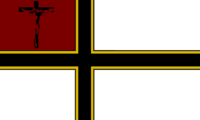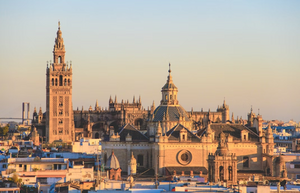Kirche der Königlich
This article is incomplete because it is pending further input from participants, or it is a work-in-progress by one author. Please comment on this article's talk page to share your input, comments and questions. Note: To contribute to this article, you may need to seek help from the author(s) of this page. |
 Church of the Royal | |
|---|---|
| Kirche der Königlich | |
 | |
| Abbreviation | KK, KdK |
| Classification | Entstehung Reformationist |
| Orientation | Calvinism |
| Scripture | Bible, Five solae |
| Theology | Binitarianism |
| Polity | Episcopal |
| Governance | Hunberht Holy See |
| Königlich Papst | Theotleib V |
| Region | Imperial |
| Language | Commoner German, English |
| Liturgy | Roman Rite |
| Headquarters | Hunberht Cathedral/Hunberht Holy See |
| Founder | Hunberht Bernhard Feld |
| Origin | December 3rd, 1152 Maximus State, TECT |
| Branched from | The Imperial Orthodox-Catholic Church & Protestant Church |
| Members | 1.1 - 1.5 Billion people |
| Slogan | "In the Name of the Father, His Son, and the Holy Spirit." |
The "Kirche der Königlich" (often shortened to "Königlich Kirche"), translated as "Church of the Royal"/"Royal Church" in German, is the largest Christian denomination and religion within The Empire of Common Territories. Over 1 billion people are baptized into the faith according to the Hunberht Holy See with the closest runner-up (Protestant Church) being short of 200 million people. Königlich Kirche is among the oldest surviving institutions within the Empire, having roots well past its creation in the 12th Century and playing a major part in the development of Imperiorum Regni Civilization.
History
Etymology
Origins of the Kirche's name have long been shrouded in mystery as no official origin source has ever been confirmed. There were texts written during and after the initial years of the Kirche's founding that may have gave insight on why the founders went with the term "Königlich" instead of a more unifying/simplified title; for example, Papst Jonathan III attempted to change the name to "Kaiserliche Ursprungskirche" (could be translated into many names, but in english most preferred "Imperial Founding Church") but was defeated by his Bishops in doing so. There are few mainstream theories on the origin of the Kirche's name, but two specific theories are supported by Kirche historians as being the most legitimate. These two theories are the "Emperor's Theory" and the "Continental Theory."
Emperor's Theory
The first theory is that the Royal moniker was adopted by (or accepted in large part) by the Kirche's founding Papst, Emperor Theotleib V. Theotleib V abdicated the throne in his later years to his eldest son Walther largely because of his declining health. Believing he was mere months away from death, abdicated Emperor Theotleib V sought a quiet retirement in the countryside of modern Maximus State. It was here that Theotleib V was met with many of the Empire's first Christian populations. Theotleib V had prayed to many of the Angels within TECT Mythology in order to recover his health but no breakthroughs would occur. That is until he gave a local priest, a devout Catholic immigrant from the deep south, the chance to convince him of Christianity's power. According to Theotleib V, the day he spent with the priest was largely spent learning the faith and its practices, and then praying that night together for the first time. That next morning Theotleib V awoke from a long dream in which he claims to have spoken to a strangely familiar man whom fondly spoke to him as if they had known each other since childhood. The man, whom he later described as Jesus Christ, told him a great many things about his future he outlined in a diary years later, but said Jesus had told him that God had heard of his many prayers from his Angels and awaited for this day when he would seek out the Lord and His Son so that those prayers may finally be heard. Theotleib V also said that at the end of the dream, Jesus told him that to save himself he must rescue his soul so that God's plan for him could reach its climax. "And he said unto me, 'Theo, rescue your soul and deliver that same compassion onto your countryman. I promise you in the name of the Lord that if you do, my Father's plan for you will only conclude after you are ready for my embrace in God's Kingdom.'" Later that morning when Theotleib V went to meet the same priest so that he could be baptized, he was met by a different man claiming to be that town's priest. After a short conversation, the priest had never heard of the man Theotleib V had met, especially since he was not familiar with Christianity spreading south of the Empire as of yet. Theotleib V quietly concluded that the familiar man in his dream, whom he believed was Jesus Christ, was only familiar because the man he had spent the day with prior was the same individual.
Once Baptized, Theotleib V continued learning the Catholic faith and atteneding services every chance he got. His health not only ceased declining but had otherwise turned around; Theotleib V could now not only walk again but even run, a miracle for a man in his early sixties. Theotleib V decided to keep his promise with Jesus Christ, forgoing retirement and returning to the capital to begin preaching the word of Jesus Christ. Theotleib V would later pass away at the age of eighty-two, but not before converting his family, a great number of people in the Homeland, and of course helping to found the Kirche as its first Papst and Saint. Therefor the theory states that the name either came directly from Theotleib V's and his family's status, or that Kirche adopted it in honor of Theotleib V.